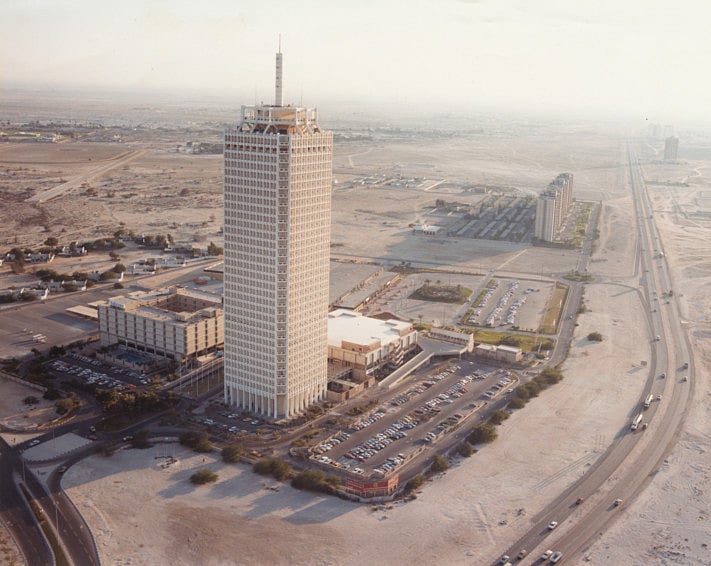Could a building possess the heart of a child?
I was suddenly taken aback when I noticed we weren’t anywhere near Bur Juman

I’d thanked my lucky stars one hot afternoon when a taxi had pulled up for me outside the bustling Dubai World Trade Centre. We’re talking 15 years ago before the era of smartphones and apps.
Lucky stars aside, I’d even thanked the DWTC, for to me this exceptional building is a childhood pal. It might even seem this way to residents and old-timers from the city.
If I may speak for some UAE expats in the 1970s, I’d say that the early landmarks granted to the city its very own heart. DWTC, for example, now dwarfed by global icons such as Burj Khalifa and Burj Al Arab, belongs to an era when even a cup of chai could symbolise an emotional hug.
The brew reminded us of our kin, and to those who came from lush green places with rainy climates — chai was a letter from home.
In those days, you could miss a heartbeat when Dubai’s only skyscraper would advance into view. The build-up to this majestic 38-storey structure was truly magical because it towered alone over a blanket of sand across a lengthy road.
Solitary ‘lighthouse’
This solitary ‘lighthouse’ poised in its solitude yet teaming with people could offer a worthy tribute to planet Earth — the only known body in the universe with human life.
While the highest paid artist David Hockney uses art nowadays to provide hope to those isolated from the rest of the world, UAE-based artist Andrew Scanlan depicts solitude in a form of cellular art.
His self-developed style complements the window layout of the DWTC, which as a child I’d tried to count from my dad’s car, 1, 2, 3 … 13, nose pressed against the glass before speeding off.
To some of us, the city’s transformation is a psychological tapestry, acting as a veil betwixt the mind’s eye and the spaces which existed before Dubai’s cornucopia of architectural constructions. In such spaces, the heart is a child.
Cut to 10 years ago when I was outside the DWTC, well after sunset. This time, I’d thanked the DWTC while waiting for a passenger to vacate a cab. Hopped in and delivered a customary greeting As-Salaam-Alaikum.
A song on the radio
Right then, I’d noticed that the driver seemed to be unable to resist a song on the radio. He’d increased the volume, then decreased it to ask where I’d like to go. “Bur Juman”, I’d replied, and saw him proceed to be captivated by this song. Clearly, he was smitten by it.
It so happened that I was smitten by it, too. Feeling a sense of camaraderie for our mutual taste, I’d requested him to crank it up. He’d happily obliged, and there we were, listening to a desi number Dil To Bachcha Hai, which in English translates to ‘The heart is a child’.
Lost in the music, he’d played the tabla on his steering wheel while I’d tapped the dhol on the sides of my handbag.
After the song drew to an end, I was suddenly taken aback when I noticed we weren’t anywhere near Bur Juman. In fact, I was somewhere unrecognisable, with towering, uninhabited buildings along a sparsely driven highway.
Journeying into the nightfall, I’d asked where we were?
Barsha One or Bur Juman?
“Almost there, Barsha One”, he’d replied.
“Barsha One? Barsha One? What on earth is Barsha One?”, I’d retorted, reminding myself how dynamically Dubai has grown and all that, immediately sparked,“ Hey! I said Bur Juman, not Barsha One”.
“They do sound similar, don’t they?”, we’d chuckled.
While driving back, he expressly refused to take a fee for the trip. Placing his hand on his heart, he’d even refused to accept the estimated fee that I’d have paid.
Reason? He’d explained that the DWTC had always been kind to him by scoring customers in time to achieve his monthly targets. Hence, he’d wished to express his gratitude.
“Hmm, so it’s not just us old-timers who’ve received high fives from DWTC, is it?”, I’d deduced.
Before I’d exited the cab, paying what I’d thought was fair, he’d bid farewell by quoting the title of the song.
“Yes”, I’d replied, “the heart is a child”.
Melissa Randhawa is a UAE-based journalist for 27 years. Born and raised in Dubai, she writes with fondness about this dynamic hub and its wonderfully diverse community.
Sign up for the Daily Briefing
Get the latest news and updates straight to your inbox
Network Links
GN StoreDownload our app
© Al Nisr Publishing LLC 2026. All rights reserved.